Organisational Behaviour: Influencing Factors, Evaluation of Motivation, Effective Teamwork
VerifiedAdded on 2022/12/23
|12
|3815
|65
AI Summary
This document discusses the various influencing factors in organisational behaviour, including organisational culture, politics, and power. It also evaluates different motivation theories and the importance of effective teamwork. The case study focuses on Tesco, a leading retailer in the United Kingdom.
Contribute Materials
Your contribution can guide someone’s learning journey. Share your
documents today.
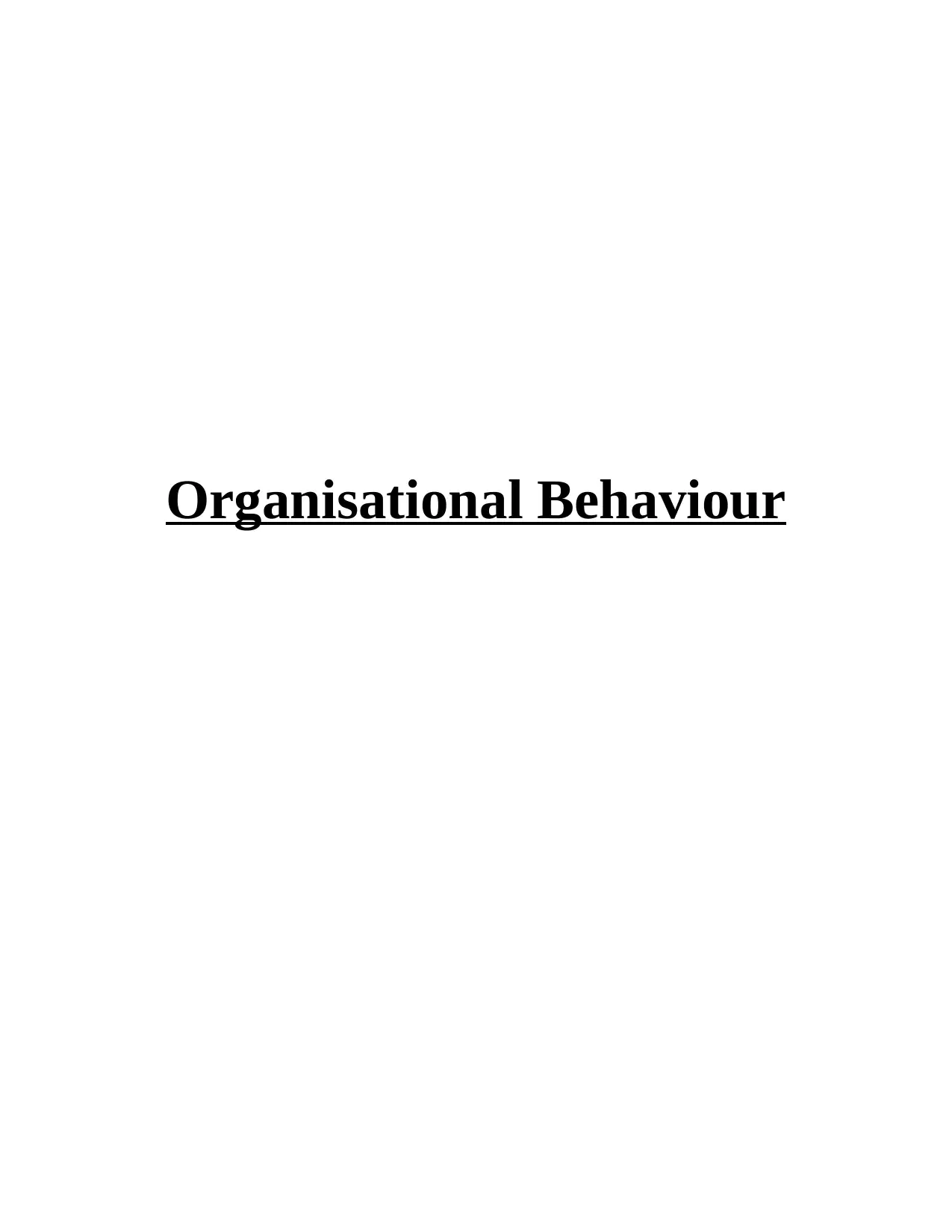
Organisational Behaviour
Secure Best Marks with AI Grader
Need help grading? Try our AI Grader for instant feedback on your assignments.
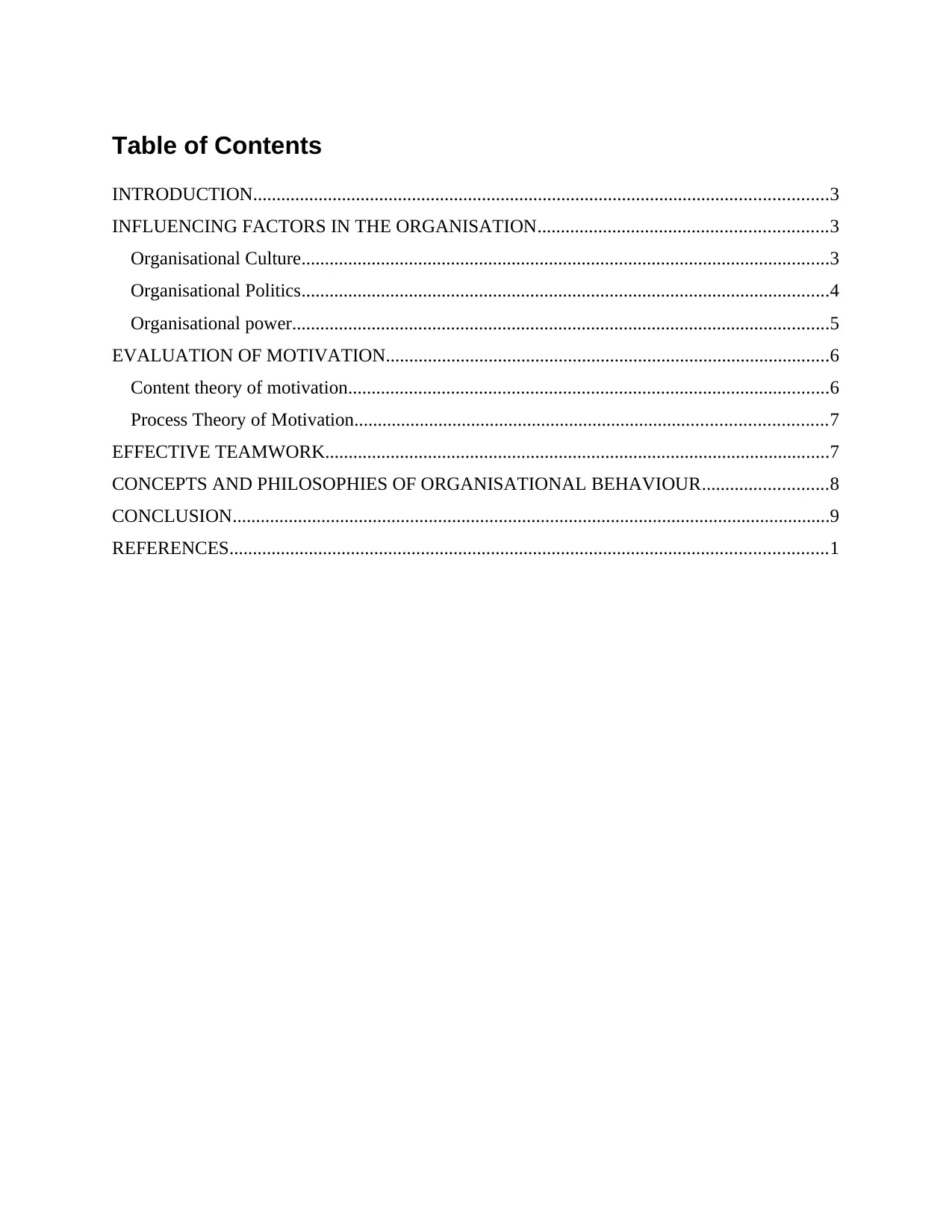
Table of Contents
INTRODUCTION...........................................................................................................................3
INFLUENCING FACTORS IN THE ORGANISATION..............................................................3
Organisational Culture.................................................................................................................3
Organisational Politics.................................................................................................................4
Organisational power...................................................................................................................5
EVALUATION OF MOTIVATION...............................................................................................6
Content theory of motivation.......................................................................................................6
Process Theory of Motivation.....................................................................................................7
EFFECTIVE TEAMWORK............................................................................................................7
CONCEPTS AND PHILOSOPHIES OF ORGANISATIONAL BEHAVIOUR...........................8
CONCLUSION................................................................................................................................9
REFERENCES................................................................................................................................1
INTRODUCTION...........................................................................................................................3
INFLUENCING FACTORS IN THE ORGANISATION..............................................................3
Organisational Culture.................................................................................................................3
Organisational Politics.................................................................................................................4
Organisational power...................................................................................................................5
EVALUATION OF MOTIVATION...............................................................................................6
Content theory of motivation.......................................................................................................6
Process Theory of Motivation.....................................................................................................7
EFFECTIVE TEAMWORK............................................................................................................7
CONCEPTS AND PHILOSOPHIES OF ORGANISATIONAL BEHAVIOUR...........................8
CONCLUSION................................................................................................................................9
REFERENCES................................................................................................................................1
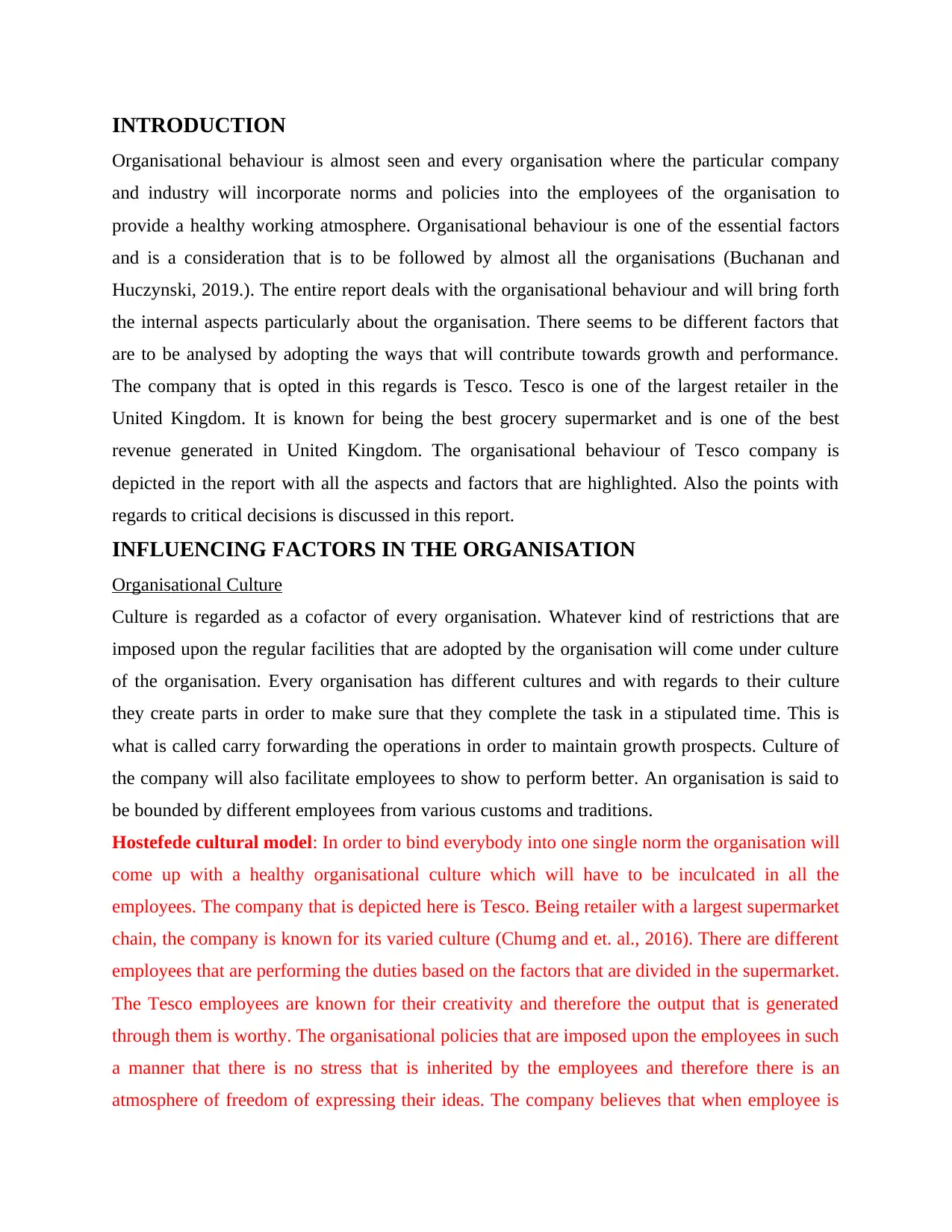
INTRODUCTION
Organisational behaviour is almost seen and every organisation where the particular company
and industry will incorporate norms and policies into the employees of the organisation to
provide a healthy working atmosphere. Organisational behaviour is one of the essential factors
and is a consideration that is to be followed by almost all the organisations (Buchanan and
Huczynski, 2019.). The entire report deals with the organisational behaviour and will bring forth
the internal aspects particularly about the organisation. There seems to be different factors that
are to be analysed by adopting the ways that will contribute towards growth and performance.
The company that is opted in this regards is Tesco. Tesco is one of the largest retailer in the
United Kingdom. It is known for being the best grocery supermarket and is one of the best
revenue generated in United Kingdom. The organisational behaviour of Tesco company is
depicted in the report with all the aspects and factors that are highlighted. Also the points with
regards to critical decisions is discussed in this report.
INFLUENCING FACTORS IN THE ORGANISATION
Organisational Culture
Culture is regarded as a cofactor of every organisation. Whatever kind of restrictions that are
imposed upon the regular facilities that are adopted by the organisation will come under culture
of the organisation. Every organisation has different cultures and with regards to their culture
they create parts in order to make sure that they complete the task in a stipulated time. This is
what is called carry forwarding the operations in order to maintain growth prospects. Culture of
the company will also facilitate employees to show to perform better. An organisation is said to
be bounded by different employees from various customs and traditions.
Hostefede cultural model: In order to bind everybody into one single norm the organisation will
come up with a healthy organisational culture which will have to be inculcated in all the
employees. The company that is depicted here is Tesco. Being retailer with a largest supermarket
chain, the company is known for its varied culture (Chumg and et. al., 2016). There are different
employees that are performing the duties based on the factors that are divided in the supermarket.
The Tesco employees are known for their creativity and therefore the output that is generated
through them is worthy. The organisational policies that are imposed upon the employees in such
a manner that there is no stress that is inherited by the employees and therefore there is an
atmosphere of freedom of expressing their ideas. The company believes that when employee is
Organisational behaviour is almost seen and every organisation where the particular company
and industry will incorporate norms and policies into the employees of the organisation to
provide a healthy working atmosphere. Organisational behaviour is one of the essential factors
and is a consideration that is to be followed by almost all the organisations (Buchanan and
Huczynski, 2019.). The entire report deals with the organisational behaviour and will bring forth
the internal aspects particularly about the organisation. There seems to be different factors that
are to be analysed by adopting the ways that will contribute towards growth and performance.
The company that is opted in this regards is Tesco. Tesco is one of the largest retailer in the
United Kingdom. It is known for being the best grocery supermarket and is one of the best
revenue generated in United Kingdom. The organisational behaviour of Tesco company is
depicted in the report with all the aspects and factors that are highlighted. Also the points with
regards to critical decisions is discussed in this report.
INFLUENCING FACTORS IN THE ORGANISATION
Organisational Culture
Culture is regarded as a cofactor of every organisation. Whatever kind of restrictions that are
imposed upon the regular facilities that are adopted by the organisation will come under culture
of the organisation. Every organisation has different cultures and with regards to their culture
they create parts in order to make sure that they complete the task in a stipulated time. This is
what is called carry forwarding the operations in order to maintain growth prospects. Culture of
the company will also facilitate employees to show to perform better. An organisation is said to
be bounded by different employees from various customs and traditions.
Hostefede cultural model: In order to bind everybody into one single norm the organisation will
come up with a healthy organisational culture which will have to be inculcated in all the
employees. The company that is depicted here is Tesco. Being retailer with a largest supermarket
chain, the company is known for its varied culture (Chumg and et. al., 2016). There are different
employees that are performing the duties based on the factors that are divided in the supermarket.
The Tesco employees are known for their creativity and therefore the output that is generated
through them is worthy. The organisational policies that are imposed upon the employees in such
a manner that there is no stress that is inherited by the employees and therefore there is an
atmosphere of freedom of expressing their ideas. The company believes that when employee is
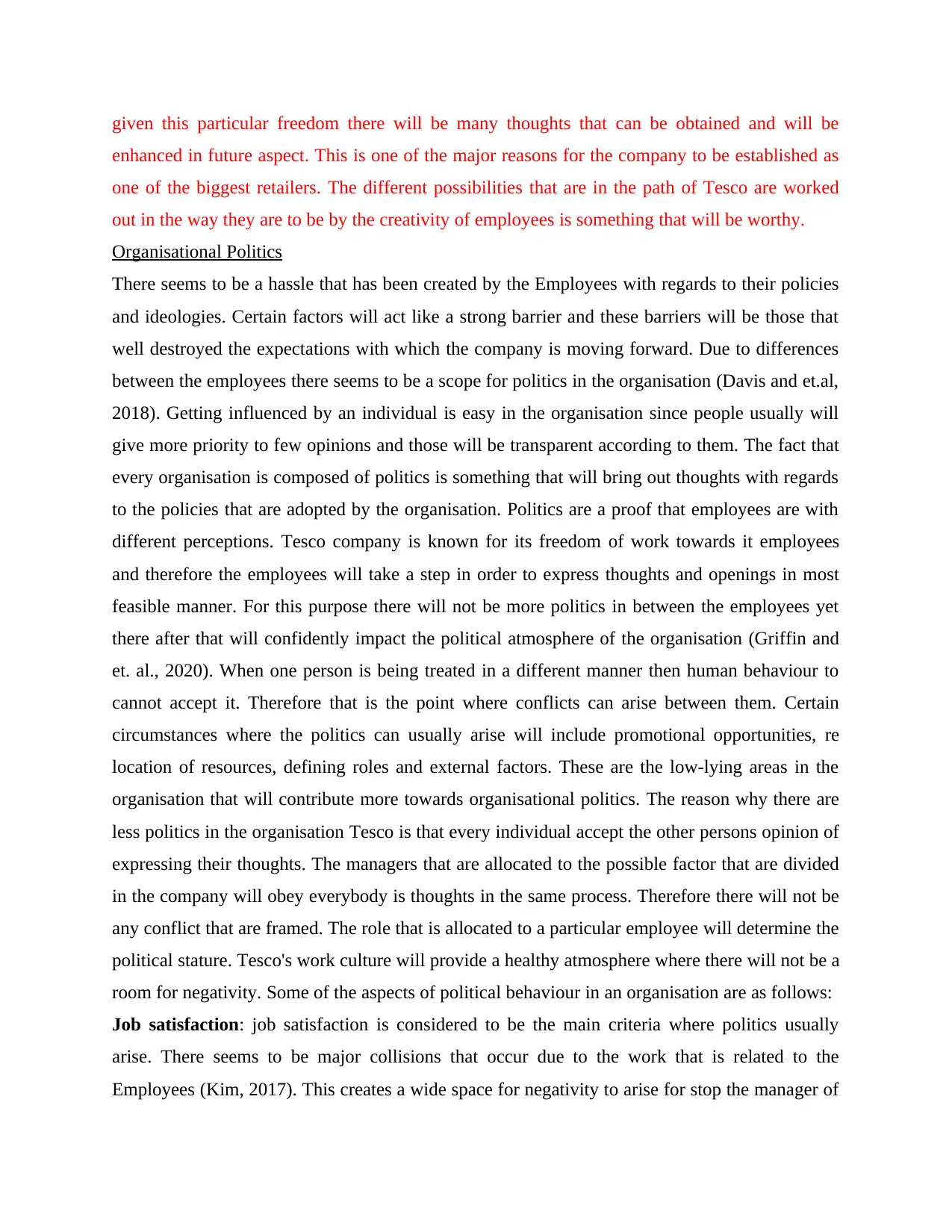
given this particular freedom there will be many thoughts that can be obtained and will be
enhanced in future aspect. This is one of the major reasons for the company to be established as
one of the biggest retailers. The different possibilities that are in the path of Tesco are worked
out in the way they are to be by the creativity of employees is something that will be worthy.
Organisational Politics
There seems to be a hassle that has been created by the Employees with regards to their policies
and ideologies. Certain factors will act like a strong barrier and these barriers will be those that
well destroyed the expectations with which the company is moving forward. Due to differences
between the employees there seems to be a scope for politics in the organisation (Davis and et.al,
2018). Getting influenced by an individual is easy in the organisation since people usually will
give more priority to few opinions and those will be transparent according to them. The fact that
every organisation is composed of politics is something that will bring out thoughts with regards
to the policies that are adopted by the organisation. Politics are a proof that employees are with
different perceptions. Tesco company is known for its freedom of work towards it employees
and therefore the employees will take a step in order to express thoughts and openings in most
feasible manner. For this purpose there will not be more politics in between the employees yet
there after that will confidently impact the political atmosphere of the organisation (Griffin and
et. al., 2020). When one person is being treated in a different manner then human behaviour to
cannot accept it. Therefore that is the point where conflicts can arise between them. Certain
circumstances where the politics can usually arise will include promotional opportunities, re
location of resources, defining roles and external factors. These are the low-lying areas in the
organisation that will contribute more towards organisational politics. The reason why there are
less politics in the organisation Tesco is that every individual accept the other persons opinion of
expressing their thoughts. The managers that are allocated to the possible factor that are divided
in the company will obey everybody is thoughts in the same process. Therefore there will not be
any conflict that are framed. The role that is allocated to a particular employee will determine the
political stature. Tesco's work culture will provide a healthy atmosphere where there will not be a
room for negativity. Some of the aspects of political behaviour in an organisation are as follows:
Job satisfaction: job satisfaction is considered to be the main criteria where politics usually
arise. There seems to be major collisions that occur due to the work that is related to the
Employees (Kim, 2017). This creates a wide space for negativity to arise for stop the manager of
enhanced in future aspect. This is one of the major reasons for the company to be established as
one of the biggest retailers. The different possibilities that are in the path of Tesco are worked
out in the way they are to be by the creativity of employees is something that will be worthy.
Organisational Politics
There seems to be a hassle that has been created by the Employees with regards to their policies
and ideologies. Certain factors will act like a strong barrier and these barriers will be those that
well destroyed the expectations with which the company is moving forward. Due to differences
between the employees there seems to be a scope for politics in the organisation (Davis and et.al,
2018). Getting influenced by an individual is easy in the organisation since people usually will
give more priority to few opinions and those will be transparent according to them. The fact that
every organisation is composed of politics is something that will bring out thoughts with regards
to the policies that are adopted by the organisation. Politics are a proof that employees are with
different perceptions. Tesco company is known for its freedom of work towards it employees
and therefore the employees will take a step in order to express thoughts and openings in most
feasible manner. For this purpose there will not be more politics in between the employees yet
there after that will confidently impact the political atmosphere of the organisation (Griffin and
et. al., 2020). When one person is being treated in a different manner then human behaviour to
cannot accept it. Therefore that is the point where conflicts can arise between them. Certain
circumstances where the politics can usually arise will include promotional opportunities, re
location of resources, defining roles and external factors. These are the low-lying areas in the
organisation that will contribute more towards organisational politics. The reason why there are
less politics in the organisation Tesco is that every individual accept the other persons opinion of
expressing their thoughts. The managers that are allocated to the possible factor that are divided
in the company will obey everybody is thoughts in the same process. Therefore there will not be
any conflict that are framed. The role that is allocated to a particular employee will determine the
political stature. Tesco's work culture will provide a healthy atmosphere where there will not be a
room for negativity. Some of the aspects of political behaviour in an organisation are as follows:
Job satisfaction: job satisfaction is considered to be the main criteria where politics usually
arise. There seems to be major collisions that occur due to the work that is related to the
Employees (Kim, 2017). This creates a wide space for negativity to arise for stop the manager of
Secure Best Marks with AI Grader
Need help grading? Try our AI Grader for instant feedback on your assignments.
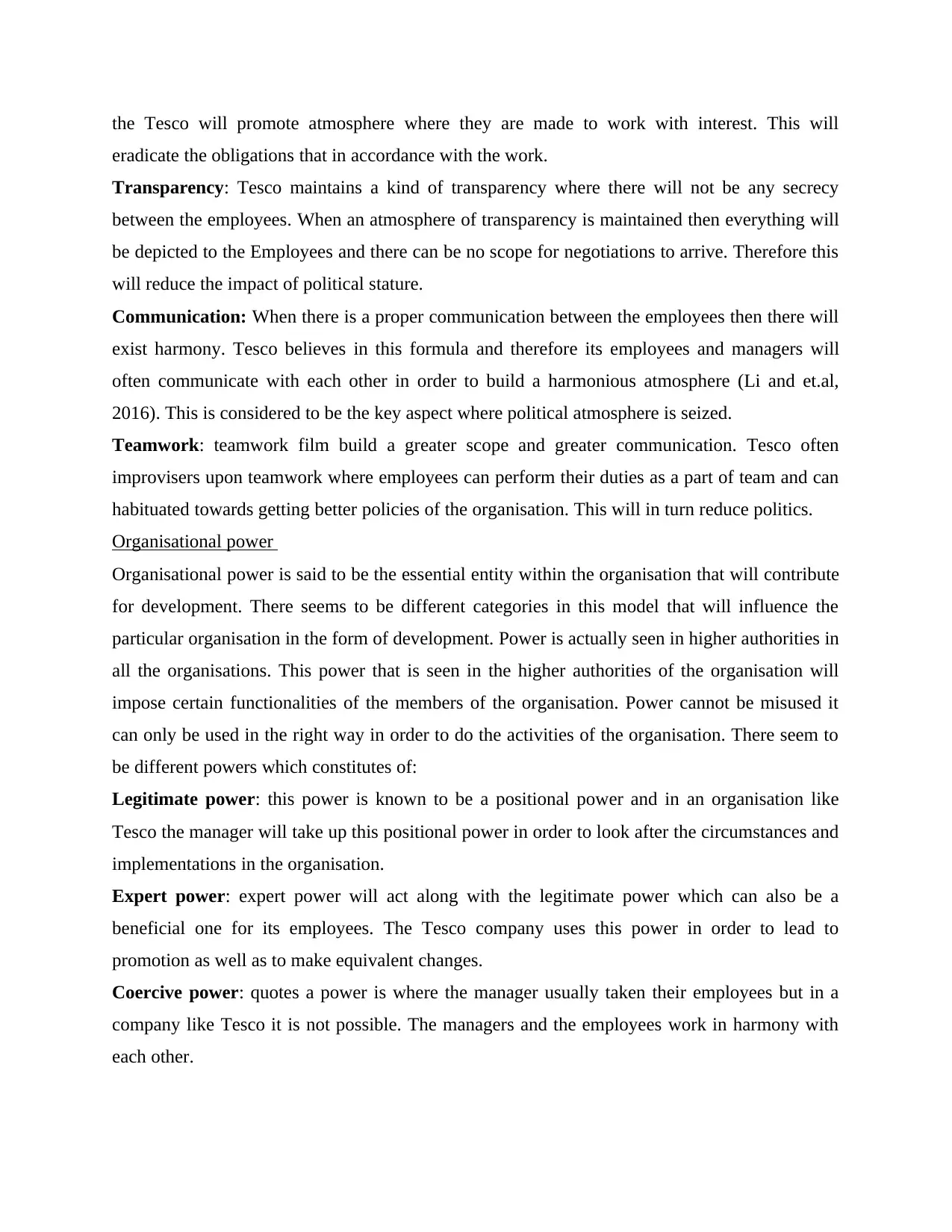
the Tesco will promote atmosphere where they are made to work with interest. This will
eradicate the obligations that in accordance with the work.
Transparency: Tesco maintains a kind of transparency where there will not be any secrecy
between the employees. When an atmosphere of transparency is maintained then everything will
be depicted to the Employees and there can be no scope for negotiations to arrive. Therefore this
will reduce the impact of political stature.
Communication: When there is a proper communication between the employees then there will
exist harmony. Tesco believes in this formula and therefore its employees and managers will
often communicate with each other in order to build a harmonious atmosphere (Li and et.al,
2016). This is considered to be the key aspect where political atmosphere is seized.
Teamwork: teamwork film build a greater scope and greater communication. Tesco often
improvisers upon teamwork where employees can perform their duties as a part of team and can
habituated towards getting better policies of the organisation. This will in turn reduce politics.
Organisational power
Organisational power is said to be the essential entity within the organisation that will contribute
for development. There seems to be different categories in this model that will influence the
particular organisation in the form of development. Power is actually seen in higher authorities in
all the organisations. This power that is seen in the higher authorities of the organisation will
impose certain functionalities of the members of the organisation. Power cannot be misused it
can only be used in the right way in order to do the activities of the organisation. There seem to
be different powers which constitutes of:
Legitimate power: this power is known to be a positional power and in an organisation like
Tesco the manager will take up this positional power in order to look after the circumstances and
implementations in the organisation.
Expert power: expert power will act along with the legitimate power which can also be a
beneficial one for its employees. The Tesco company uses this power in order to lead to
promotion as well as to make equivalent changes.
Coercive power: quotes a power is where the manager usually taken their employees but in a
company like Tesco it is not possible. The managers and the employees work in harmony with
each other.
eradicate the obligations that in accordance with the work.
Transparency: Tesco maintains a kind of transparency where there will not be any secrecy
between the employees. When an atmosphere of transparency is maintained then everything will
be depicted to the Employees and there can be no scope for negotiations to arrive. Therefore this
will reduce the impact of political stature.
Communication: When there is a proper communication between the employees then there will
exist harmony. Tesco believes in this formula and therefore its employees and managers will
often communicate with each other in order to build a harmonious atmosphere (Li and et.al,
2016). This is considered to be the key aspect where political atmosphere is seized.
Teamwork: teamwork film build a greater scope and greater communication. Tesco often
improvisers upon teamwork where employees can perform their duties as a part of team and can
habituated towards getting better policies of the organisation. This will in turn reduce politics.
Organisational power
Organisational power is said to be the essential entity within the organisation that will contribute
for development. There seems to be different categories in this model that will influence the
particular organisation in the form of development. Power is actually seen in higher authorities in
all the organisations. This power that is seen in the higher authorities of the organisation will
impose certain functionalities of the members of the organisation. Power cannot be misused it
can only be used in the right way in order to do the activities of the organisation. There seem to
be different powers which constitutes of:
Legitimate power: this power is known to be a positional power and in an organisation like
Tesco the manager will take up this positional power in order to look after the circumstances and
implementations in the organisation.
Expert power: expert power will act along with the legitimate power which can also be a
beneficial one for its employees. The Tesco company uses this power in order to lead to
promotion as well as to make equivalent changes.
Coercive power: quotes a power is where the manager usually taken their employees but in a
company like Tesco it is not possible. The managers and the employees work in harmony with
each other.
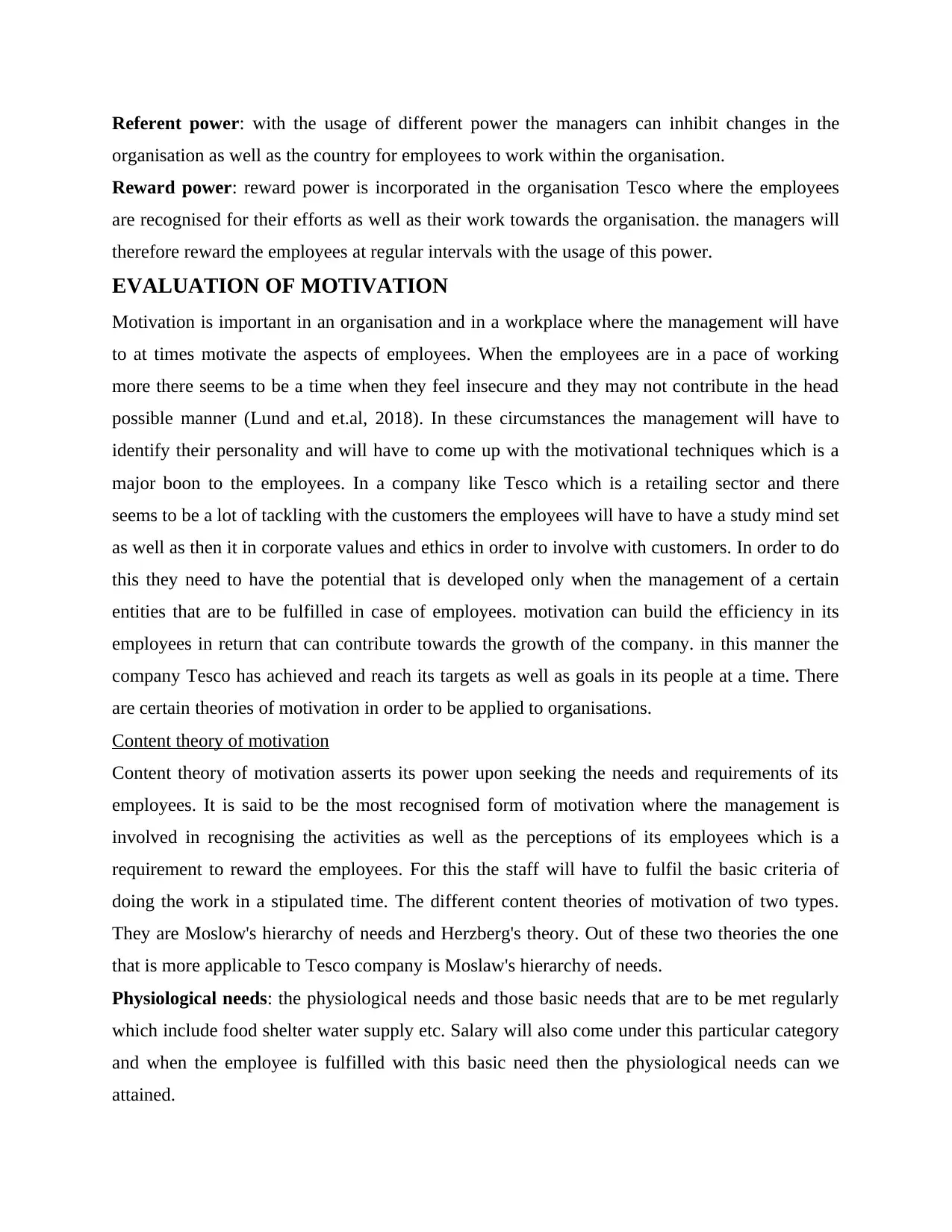
Referent power: with the usage of different power the managers can inhibit changes in the
organisation as well as the country for employees to work within the organisation.
Reward power: reward power is incorporated in the organisation Tesco where the employees
are recognised for their efforts as well as their work towards the organisation. the managers will
therefore reward the employees at regular intervals with the usage of this power.
EVALUATION OF MOTIVATION
Motivation is important in an organisation and in a workplace where the management will have
to at times motivate the aspects of employees. When the employees are in a pace of working
more there seems to be a time when they feel insecure and they may not contribute in the head
possible manner (Lund and et.al, 2018). In these circumstances the management will have to
identify their personality and will have to come up with the motivational techniques which is a
major boon to the employees. In a company like Tesco which is a retailing sector and there
seems to be a lot of tackling with the customers the employees will have to have a study mind set
as well as then it in corporate values and ethics in order to involve with customers. In order to do
this they need to have the potential that is developed only when the management of a certain
entities that are to be fulfilled in case of employees. motivation can build the efficiency in its
employees in return that can contribute towards the growth of the company. in this manner the
company Tesco has achieved and reach its targets as well as goals in its people at a time. There
are certain theories of motivation in order to be applied to organisations.
Content theory of motivation
Content theory of motivation asserts its power upon seeking the needs and requirements of its
employees. It is said to be the most recognised form of motivation where the management is
involved in recognising the activities as well as the perceptions of its employees which is a
requirement to reward the employees. For this the staff will have to fulfil the basic criteria of
doing the work in a stipulated time. The different content theories of motivation of two types.
They are Moslow's hierarchy of needs and Herzberg's theory. Out of these two theories the one
that is more applicable to Tesco company is Moslaw's hierarchy of needs.
Physiological needs: the physiological needs and those basic needs that are to be met regularly
which include food shelter water supply etc. Salary will also come under this particular category
and when the employee is fulfilled with this basic need then the physiological needs can we
attained.
organisation as well as the country for employees to work within the organisation.
Reward power: reward power is incorporated in the organisation Tesco where the employees
are recognised for their efforts as well as their work towards the organisation. the managers will
therefore reward the employees at regular intervals with the usage of this power.
EVALUATION OF MOTIVATION
Motivation is important in an organisation and in a workplace where the management will have
to at times motivate the aspects of employees. When the employees are in a pace of working
more there seems to be a time when they feel insecure and they may not contribute in the head
possible manner (Lund and et.al, 2018). In these circumstances the management will have to
identify their personality and will have to come up with the motivational techniques which is a
major boon to the employees. In a company like Tesco which is a retailing sector and there
seems to be a lot of tackling with the customers the employees will have to have a study mind set
as well as then it in corporate values and ethics in order to involve with customers. In order to do
this they need to have the potential that is developed only when the management of a certain
entities that are to be fulfilled in case of employees. motivation can build the efficiency in its
employees in return that can contribute towards the growth of the company. in this manner the
company Tesco has achieved and reach its targets as well as goals in its people at a time. There
are certain theories of motivation in order to be applied to organisations.
Content theory of motivation
Content theory of motivation asserts its power upon seeking the needs and requirements of its
employees. It is said to be the most recognised form of motivation where the management is
involved in recognising the activities as well as the perceptions of its employees which is a
requirement to reward the employees. For this the staff will have to fulfil the basic criteria of
doing the work in a stipulated time. The different content theories of motivation of two types.
They are Moslow's hierarchy of needs and Herzberg's theory. Out of these two theories the one
that is more applicable to Tesco company is Moslaw's hierarchy of needs.
Physiological needs: the physiological needs and those basic needs that are to be met regularly
which include food shelter water supply etc. Salary will also come under this particular category
and when the employee is fulfilled with this basic need then the physiological needs can we
attained.
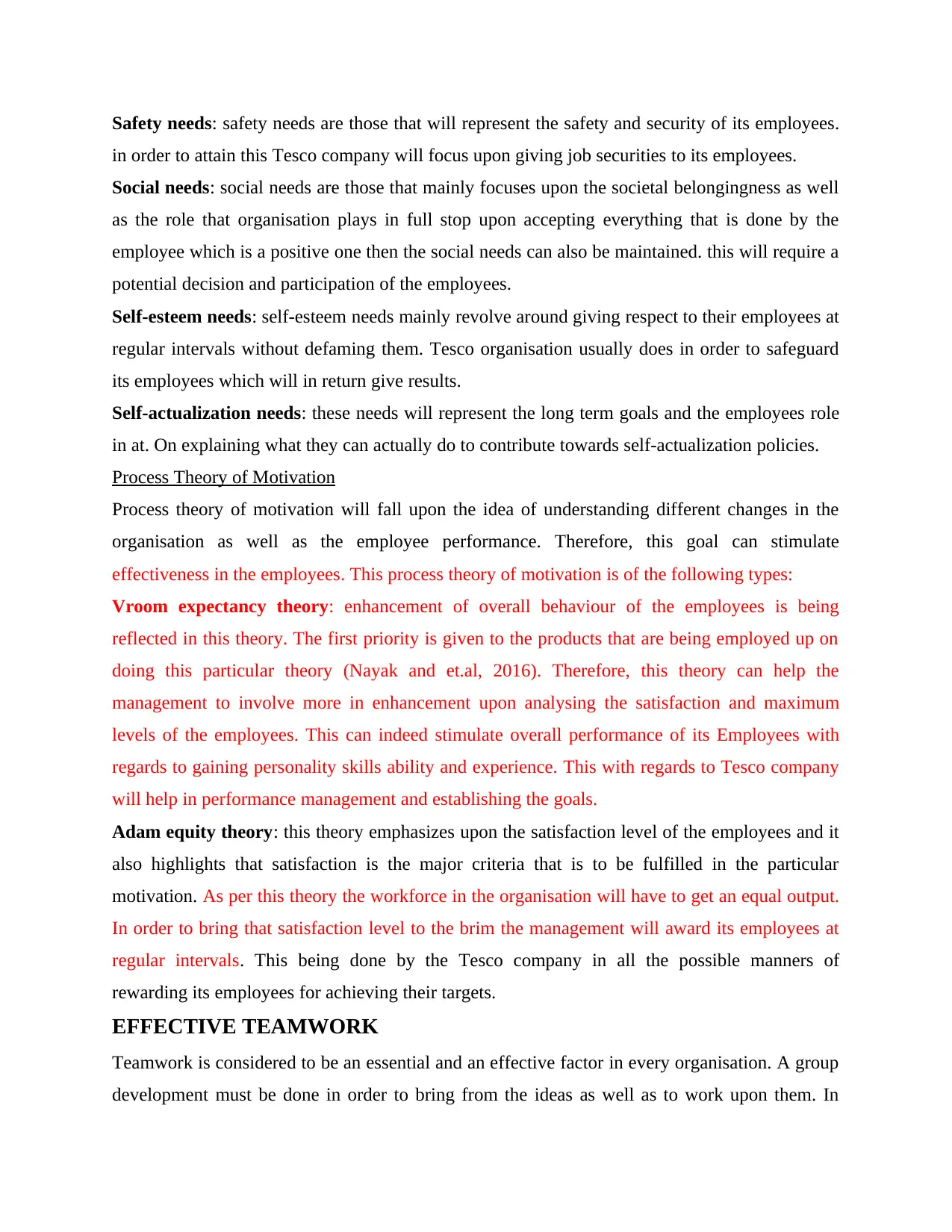
Safety needs: safety needs are those that will represent the safety and security of its employees.
in order to attain this Tesco company will focus upon giving job securities to its employees.
Social needs: social needs are those that mainly focuses upon the societal belongingness as well
as the role that organisation plays in full stop upon accepting everything that is done by the
employee which is a positive one then the social needs can also be maintained. this will require a
potential decision and participation of the employees.
Self-esteem needs: self-esteem needs mainly revolve around giving respect to their employees at
regular intervals without defaming them. Tesco organisation usually does in order to safeguard
its employees which will in return give results.
Self-actualization needs: these needs will represent the long term goals and the employees role
in at. On explaining what they can actually do to contribute towards self-actualization policies.
Process Theory of Motivation
Process theory of motivation will fall upon the idea of understanding different changes in the
organisation as well as the employee performance. Therefore, this goal can stimulate
effectiveness in the employees. This process theory of motivation is of the following types:
Vroom expectancy theory: enhancement of overall behaviour of the employees is being
reflected in this theory. The first priority is given to the products that are being employed up on
doing this particular theory (Nayak and et.al, 2016). Therefore, this theory can help the
management to involve more in enhancement upon analysing the satisfaction and maximum
levels of the employees. This can indeed stimulate overall performance of its Employees with
regards to gaining personality skills ability and experience. This with regards to Tesco company
will help in performance management and establishing the goals.
Adam equity theory: this theory emphasizes upon the satisfaction level of the employees and it
also highlights that satisfaction is the major criteria that is to be fulfilled in the particular
motivation. As per this theory the workforce in the organisation will have to get an equal output.
In order to bring that satisfaction level to the brim the management will award its employees at
regular intervals. This being done by the Tesco company in all the possible manners of
rewarding its employees for achieving their targets.
EFFECTIVE TEAMWORK
Teamwork is considered to be an essential and an effective factor in every organisation. A group
development must be done in order to bring from the ideas as well as to work upon them. In
in order to attain this Tesco company will focus upon giving job securities to its employees.
Social needs: social needs are those that mainly focuses upon the societal belongingness as well
as the role that organisation plays in full stop upon accepting everything that is done by the
employee which is a positive one then the social needs can also be maintained. this will require a
potential decision and participation of the employees.
Self-esteem needs: self-esteem needs mainly revolve around giving respect to their employees at
regular intervals without defaming them. Tesco organisation usually does in order to safeguard
its employees which will in return give results.
Self-actualization needs: these needs will represent the long term goals and the employees role
in at. On explaining what they can actually do to contribute towards self-actualization policies.
Process Theory of Motivation
Process theory of motivation will fall upon the idea of understanding different changes in the
organisation as well as the employee performance. Therefore, this goal can stimulate
effectiveness in the employees. This process theory of motivation is of the following types:
Vroom expectancy theory: enhancement of overall behaviour of the employees is being
reflected in this theory. The first priority is given to the products that are being employed up on
doing this particular theory (Nayak and et.al, 2016). Therefore, this theory can help the
management to involve more in enhancement upon analysing the satisfaction and maximum
levels of the employees. This can indeed stimulate overall performance of its Employees with
regards to gaining personality skills ability and experience. This with regards to Tesco company
will help in performance management and establishing the goals.
Adam equity theory: this theory emphasizes upon the satisfaction level of the employees and it
also highlights that satisfaction is the major criteria that is to be fulfilled in the particular
motivation. As per this theory the workforce in the organisation will have to get an equal output.
In order to bring that satisfaction level to the brim the management will award its employees at
regular intervals. This being done by the Tesco company in all the possible manners of
rewarding its employees for achieving their targets.
EFFECTIVE TEAMWORK
Teamwork is considered to be an essential and an effective factor in every organisation. A group
development must be done in order to bring from the ideas as well as to work upon them. In
Paraphrase This Document
Need a fresh take? Get an instant paraphrase of this document with our AI Paraphraser
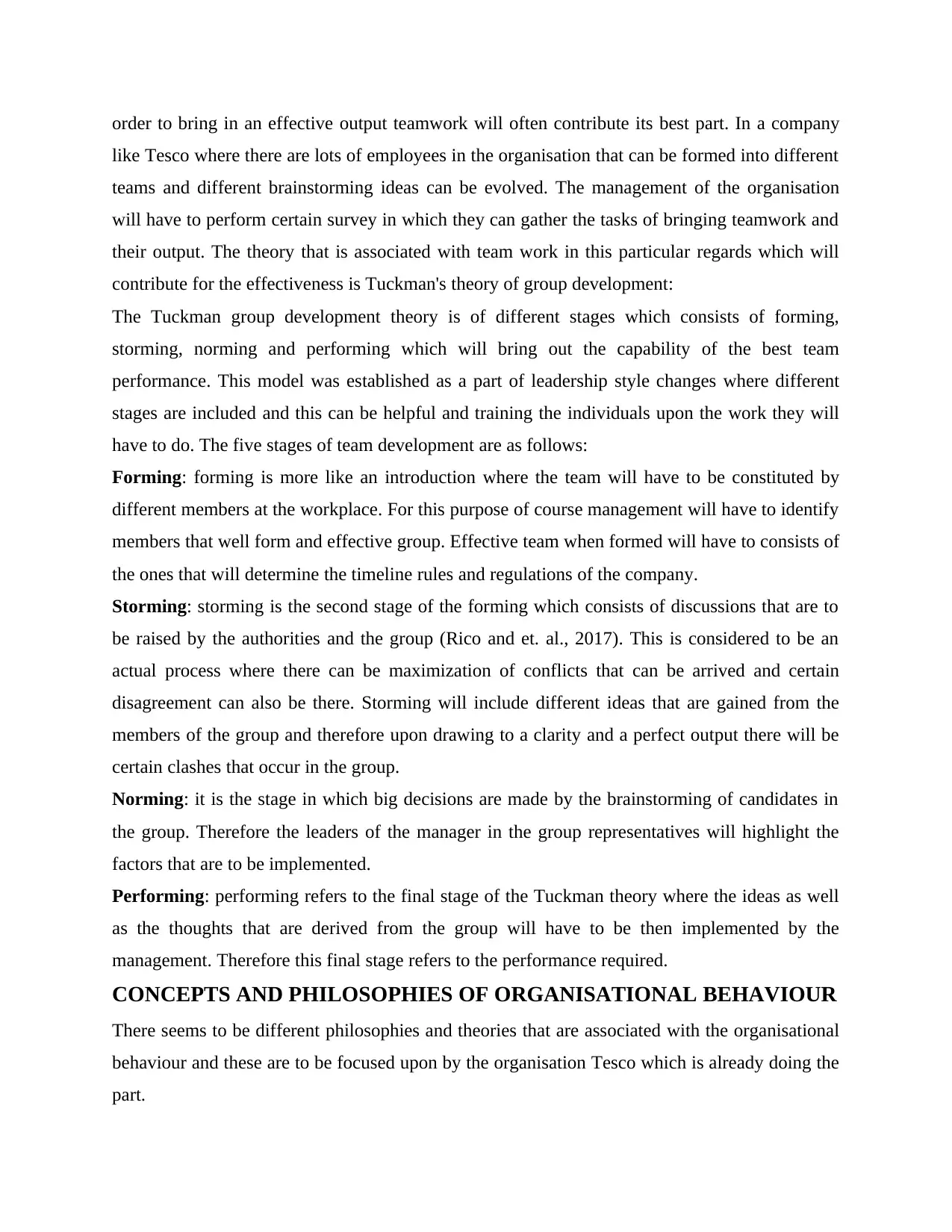
order to bring in an effective output teamwork will often contribute its best part. In a company
like Tesco where there are lots of employees in the organisation that can be formed into different
teams and different brainstorming ideas can be evolved. The management of the organisation
will have to perform certain survey in which they can gather the tasks of bringing teamwork and
their output. The theory that is associated with team work in this particular regards which will
contribute for the effectiveness is Tuckman's theory of group development:
The Tuckman group development theory is of different stages which consists of forming,
storming, norming and performing which will bring out the capability of the best team
performance. This model was established as a part of leadership style changes where different
stages are included and this can be helpful and training the individuals upon the work they will
have to do. The five stages of team development are as follows:
Forming: forming is more like an introduction where the team will have to be constituted by
different members at the workplace. For this purpose of course management will have to identify
members that well form and effective group. Effective team when formed will have to consists of
the ones that will determine the timeline rules and regulations of the company.
Storming: storming is the second stage of the forming which consists of discussions that are to
be raised by the authorities and the group (Rico and et. al., 2017). This is considered to be an
actual process where there can be maximization of conflicts that can be arrived and certain
disagreement can also be there. Storming will include different ideas that are gained from the
members of the group and therefore upon drawing to a clarity and a perfect output there will be
certain clashes that occur in the group.
Norming: it is the stage in which big decisions are made by the brainstorming of candidates in
the group. Therefore the leaders of the manager in the group representatives will highlight the
factors that are to be implemented.
Performing: performing refers to the final stage of the Tuckman theory where the ideas as well
as the thoughts that are derived from the group will have to be then implemented by the
management. Therefore this final stage refers to the performance required.
CONCEPTS AND PHILOSOPHIES OF ORGANISATIONAL BEHAVIOUR
There seems to be different philosophies and theories that are associated with the organisational
behaviour and these are to be focused upon by the organisation Tesco which is already doing the
part.
like Tesco where there are lots of employees in the organisation that can be formed into different
teams and different brainstorming ideas can be evolved. The management of the organisation
will have to perform certain survey in which they can gather the tasks of bringing teamwork and
their output. The theory that is associated with team work in this particular regards which will
contribute for the effectiveness is Tuckman's theory of group development:
The Tuckman group development theory is of different stages which consists of forming,
storming, norming and performing which will bring out the capability of the best team
performance. This model was established as a part of leadership style changes where different
stages are included and this can be helpful and training the individuals upon the work they will
have to do. The five stages of team development are as follows:
Forming: forming is more like an introduction where the team will have to be constituted by
different members at the workplace. For this purpose of course management will have to identify
members that well form and effective group. Effective team when formed will have to consists of
the ones that will determine the timeline rules and regulations of the company.
Storming: storming is the second stage of the forming which consists of discussions that are to
be raised by the authorities and the group (Rico and et. al., 2017). This is considered to be an
actual process where there can be maximization of conflicts that can be arrived and certain
disagreement can also be there. Storming will include different ideas that are gained from the
members of the group and therefore upon drawing to a clarity and a perfect output there will be
certain clashes that occur in the group.
Norming: it is the stage in which big decisions are made by the brainstorming of candidates in
the group. Therefore the leaders of the manager in the group representatives will highlight the
factors that are to be implemented.
Performing: performing refers to the final stage of the Tuckman theory where the ideas as well
as the thoughts that are derived from the group will have to be then implemented by the
management. Therefore this final stage refers to the performance required.
CONCEPTS AND PHILOSOPHIES OF ORGANISATIONAL BEHAVIOUR
There seems to be different philosophies and theories that are associated with the organisational
behaviour and these are to be focused upon by the organisation Tesco which is already doing the
part.
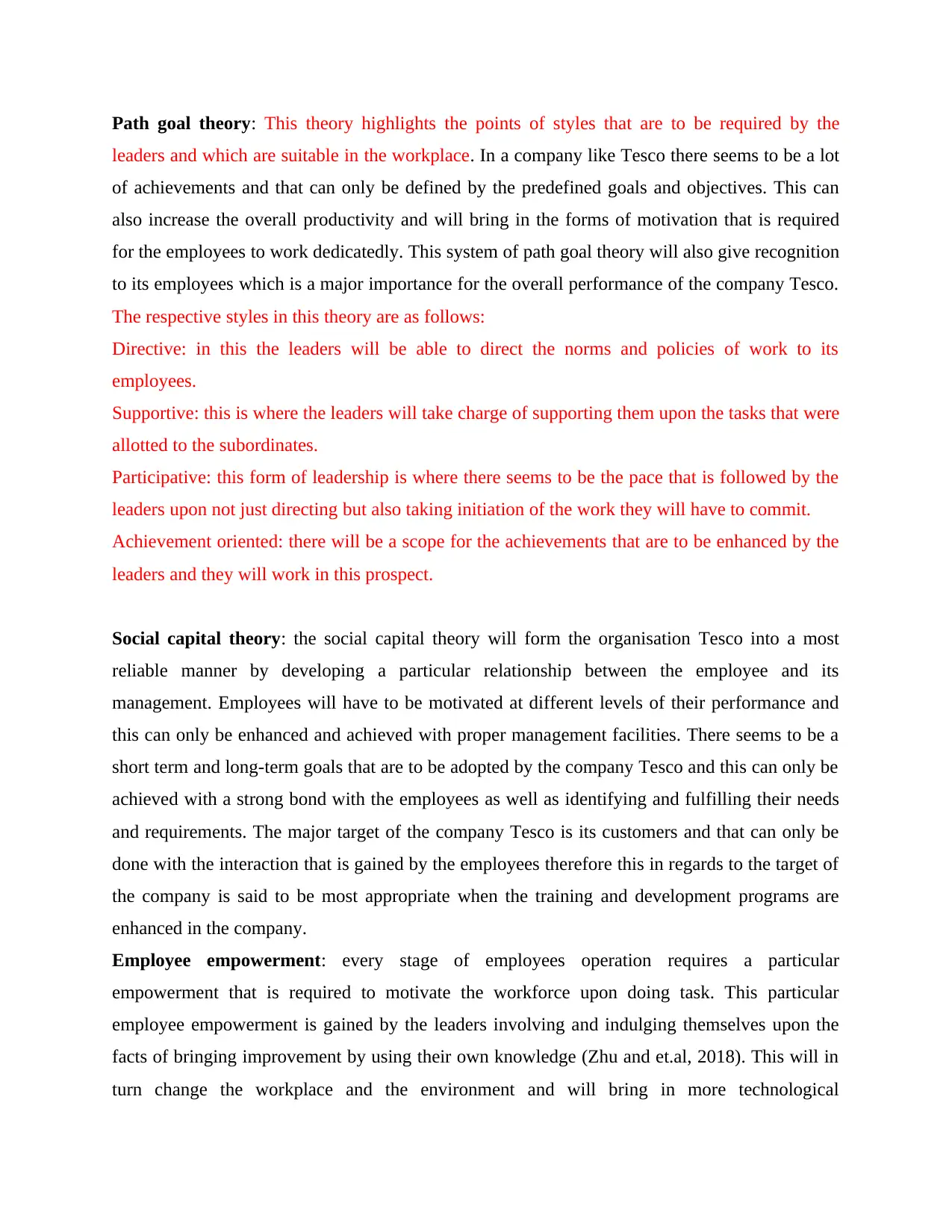
Path goal theory: This theory highlights the points of styles that are to be required by the
leaders and which are suitable in the workplace. In a company like Tesco there seems to be a lot
of achievements and that can only be defined by the predefined goals and objectives. This can
also increase the overall productivity and will bring in the forms of motivation that is required
for the employees to work dedicatedly. This system of path goal theory will also give recognition
to its employees which is a major importance for the overall performance of the company Tesco.
The respective styles in this theory are as follows:
Directive: in this the leaders will be able to direct the norms and policies of work to its
employees.
Supportive: this is where the leaders will take charge of supporting them upon the tasks that were
allotted to the subordinates.
Participative: this form of leadership is where there seems to be the pace that is followed by the
leaders upon not just directing but also taking initiation of the work they will have to commit.
Achievement oriented: there will be a scope for the achievements that are to be enhanced by the
leaders and they will work in this prospect.
Social capital theory: the social capital theory will form the organisation Tesco into a most
reliable manner by developing a particular relationship between the employee and its
management. Employees will have to be motivated at different levels of their performance and
this can only be enhanced and achieved with proper management facilities. There seems to be a
short term and long-term goals that are to be adopted by the company Tesco and this can only be
achieved with a strong bond with the employees as well as identifying and fulfilling their needs
and requirements. The major target of the company Tesco is its customers and that can only be
done with the interaction that is gained by the employees therefore this in regards to the target of
the company is said to be most appropriate when the training and development programs are
enhanced in the company.
Employee empowerment: every stage of employees operation requires a particular
empowerment that is required to motivate the workforce upon doing task. This particular
employee empowerment is gained by the leaders involving and indulging themselves upon the
facts of bringing improvement by using their own knowledge (Zhu and et.al, 2018). This will in
turn change the workplace and the environment and will bring in more technological
leaders and which are suitable in the workplace. In a company like Tesco there seems to be a lot
of achievements and that can only be defined by the predefined goals and objectives. This can
also increase the overall productivity and will bring in the forms of motivation that is required
for the employees to work dedicatedly. This system of path goal theory will also give recognition
to its employees which is a major importance for the overall performance of the company Tesco.
The respective styles in this theory are as follows:
Directive: in this the leaders will be able to direct the norms and policies of work to its
employees.
Supportive: this is where the leaders will take charge of supporting them upon the tasks that were
allotted to the subordinates.
Participative: this form of leadership is where there seems to be the pace that is followed by the
leaders upon not just directing but also taking initiation of the work they will have to commit.
Achievement oriented: there will be a scope for the achievements that are to be enhanced by the
leaders and they will work in this prospect.
Social capital theory: the social capital theory will form the organisation Tesco into a most
reliable manner by developing a particular relationship between the employee and its
management. Employees will have to be motivated at different levels of their performance and
this can only be enhanced and achieved with proper management facilities. There seems to be a
short term and long-term goals that are to be adopted by the company Tesco and this can only be
achieved with a strong bond with the employees as well as identifying and fulfilling their needs
and requirements. The major target of the company Tesco is its customers and that can only be
done with the interaction that is gained by the employees therefore this in regards to the target of
the company is said to be most appropriate when the training and development programs are
enhanced in the company.
Employee empowerment: every stage of employees operation requires a particular
empowerment that is required to motivate the workforce upon doing task. This particular
employee empowerment is gained by the leaders involving and indulging themselves upon the
facts of bringing improvement by using their own knowledge (Zhu and et.al, 2018). This will in
turn change the workplace and the environment and will bring in more technological
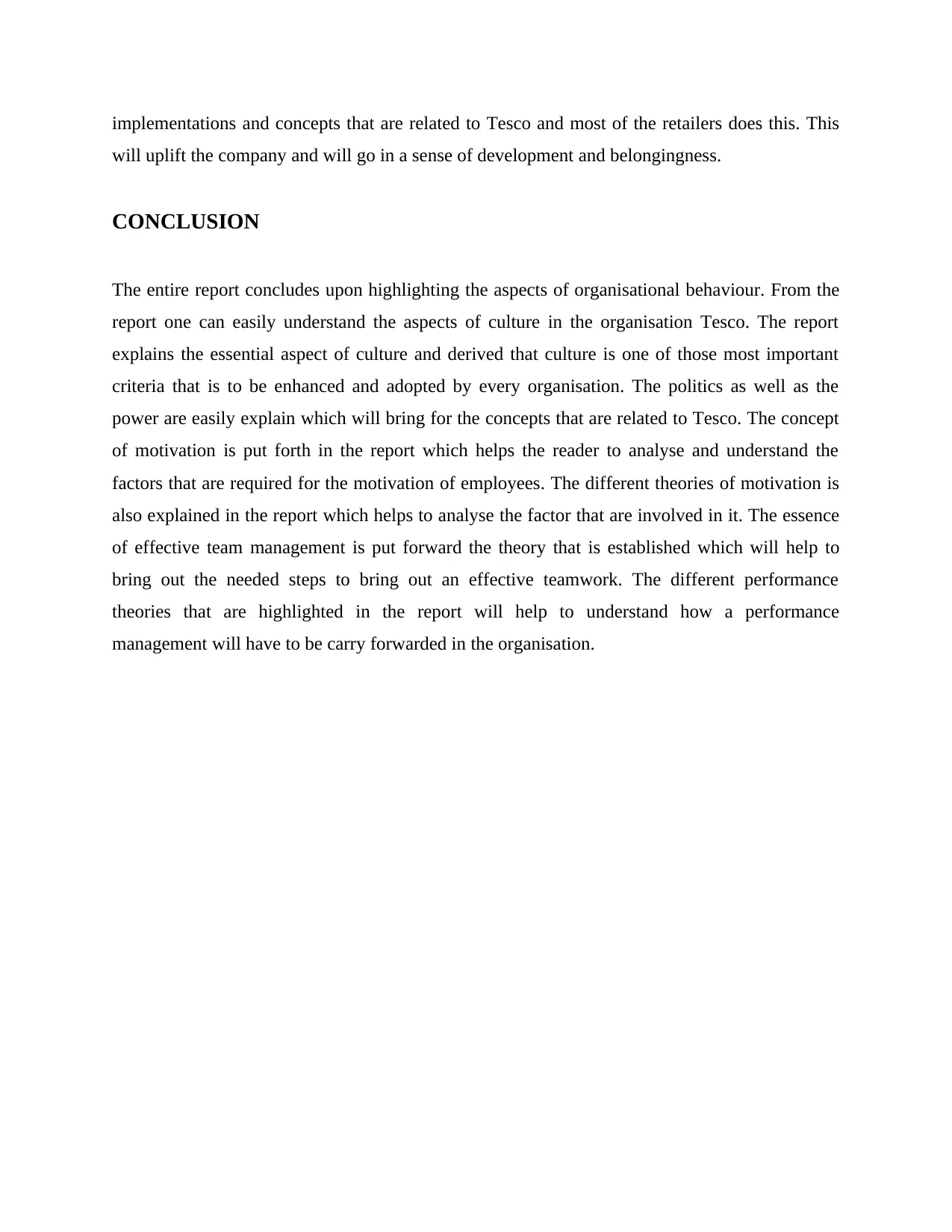
implementations and concepts that are related to Tesco and most of the retailers does this. This
will uplift the company and will go in a sense of development and belongingness.
CONCLUSION
The entire report concludes upon highlighting the aspects of organisational behaviour. From the
report one can easily understand the aspects of culture in the organisation Tesco. The report
explains the essential aspect of culture and derived that culture is one of those most important
criteria that is to be enhanced and adopted by every organisation. The politics as well as the
power are easily explain which will bring for the concepts that are related to Tesco. The concept
of motivation is put forth in the report which helps the reader to analyse and understand the
factors that are required for the motivation of employees. The different theories of motivation is
also explained in the report which helps to analyse the factor that are involved in it. The essence
of effective team management is put forward the theory that is established which will help to
bring out the needed steps to bring out an effective teamwork. The different performance
theories that are highlighted in the report will help to understand how a performance
management will have to be carry forwarded in the organisation.
will uplift the company and will go in a sense of development and belongingness.
CONCLUSION
The entire report concludes upon highlighting the aspects of organisational behaviour. From the
report one can easily understand the aspects of culture in the organisation Tesco. The report
explains the essential aspect of culture and derived that culture is one of those most important
criteria that is to be enhanced and adopted by every organisation. The politics as well as the
power are easily explain which will bring for the concepts that are related to Tesco. The concept
of motivation is put forth in the report which helps the reader to analyse and understand the
factors that are required for the motivation of employees. The different theories of motivation is
also explained in the report which helps to analyse the factor that are involved in it. The essence
of effective team management is put forward the theory that is established which will help to
bring out the needed steps to bring out an effective teamwork. The different performance
theories that are highlighted in the report will help to understand how a performance
management will have to be carry forwarded in the organisation.
Secure Best Marks with AI Grader
Need help grading? Try our AI Grader for instant feedback on your assignments.
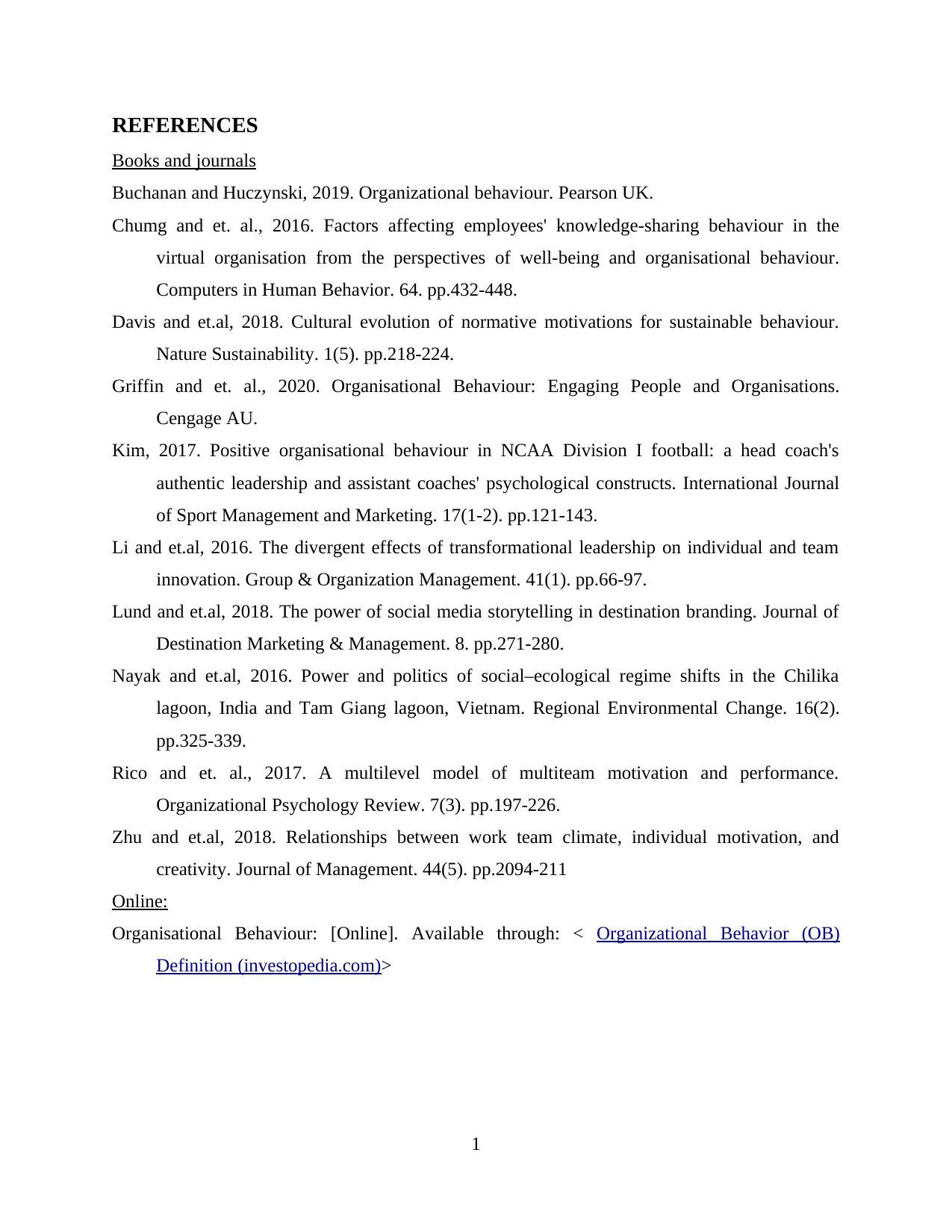
REFERENCES
Books and journals
Buchanan and Huczynski, 2019. Organizational behaviour. Pearson UK.
Chumg and et. al., 2016. Factors affecting employees' knowledge-sharing behaviour in the
virtual organisation from the perspectives of well-being and organisational behaviour.
Computers in Human Behavior. 64. pp.432-448.
Davis and et.al, 2018. Cultural evolution of normative motivations for sustainable behaviour.
Nature Sustainability. 1(5). pp.218-224.
Griffin and et. al., 2020. Organisational Behaviour: Engaging People and Organisations.
Cengage AU.
Kim, 2017. Positive organisational behaviour in NCAA Division I football: a head coach's
authentic leadership and assistant coaches' psychological constructs. International Journal
of Sport Management and Marketing. 17(1-2). pp.121-143.
Li and et.al, 2016. The divergent effects of transformational leadership on individual and team
innovation. Group & Organization Management. 41(1). pp.66-97.
Lund and et.al, 2018. The power of social media storytelling in destination branding. Journal of
Destination Marketing & Management. 8. pp.271-280.
Nayak and et.al, 2016. Power and politics of social–ecological regime shifts in the Chilika
lagoon, India and Tam Giang lagoon, Vietnam. Regional Environmental Change. 16(2).
pp.325-339.
Rico and et. al., 2017. A multilevel model of multiteam motivation and performance.
Organizational Psychology Review. 7(3). pp.197-226.
Zhu and et.al, 2018. Relationships between work team climate, individual motivation, and
creativity. Journal of Management. 44(5). pp.2094-211
Online:
Organisational Behaviour: [Online]. Available through: < Organizational Behavior (OB)
Definition (investopedia.com)>
1
Books and journals
Buchanan and Huczynski, 2019. Organizational behaviour. Pearson UK.
Chumg and et. al., 2016. Factors affecting employees' knowledge-sharing behaviour in the
virtual organisation from the perspectives of well-being and organisational behaviour.
Computers in Human Behavior. 64. pp.432-448.
Davis and et.al, 2018. Cultural evolution of normative motivations for sustainable behaviour.
Nature Sustainability. 1(5). pp.218-224.
Griffin and et. al., 2020. Organisational Behaviour: Engaging People and Organisations.
Cengage AU.
Kim, 2017. Positive organisational behaviour in NCAA Division I football: a head coach's
authentic leadership and assistant coaches' psychological constructs. International Journal
of Sport Management and Marketing. 17(1-2). pp.121-143.
Li and et.al, 2016. The divergent effects of transformational leadership on individual and team
innovation. Group & Organization Management. 41(1). pp.66-97.
Lund and et.al, 2018. The power of social media storytelling in destination branding. Journal of
Destination Marketing & Management. 8. pp.271-280.
Nayak and et.al, 2016. Power and politics of social–ecological regime shifts in the Chilika
lagoon, India and Tam Giang lagoon, Vietnam. Regional Environmental Change. 16(2).
pp.325-339.
Rico and et. al., 2017. A multilevel model of multiteam motivation and performance.
Organizational Psychology Review. 7(3). pp.197-226.
Zhu and et.al, 2018. Relationships between work team climate, individual motivation, and
creativity. Journal of Management. 44(5). pp.2094-211
Online:
Organisational Behaviour: [Online]. Available through: < Organizational Behavior (OB)
Definition (investopedia.com)>
1

2
1 out of 12
Related Documents
Your All-in-One AI-Powered Toolkit for Academic Success.
+13062052269
info@desklib.com
Available 24*7 on WhatsApp / Email
![[object Object]](/_next/static/media/star-bottom.7253800d.svg)
Unlock your academic potential
© 2024 | Zucol Services PVT LTD | All rights reserved.





